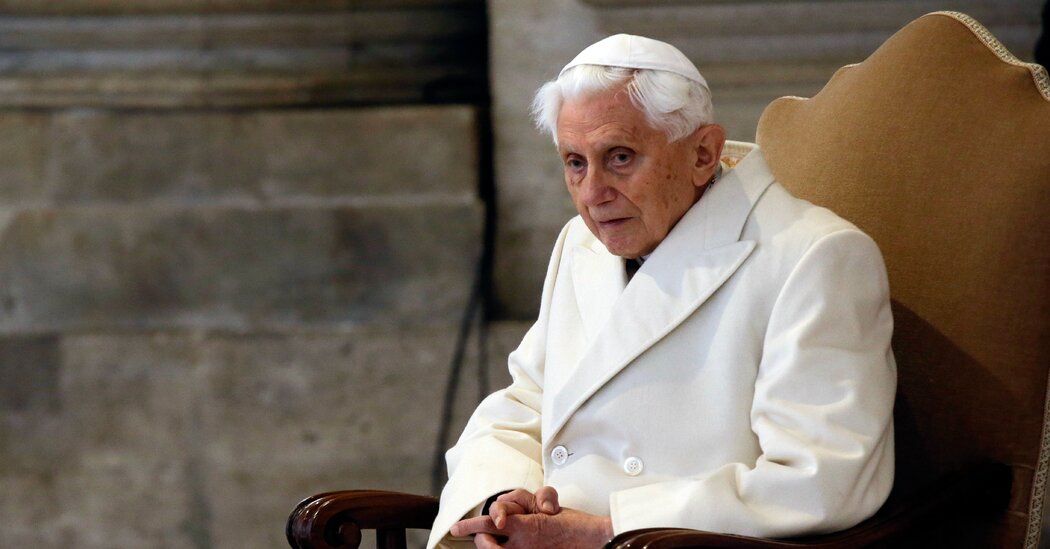ROME — Responding to a report that he mishandled four cases involving the sexual abuse of minors while he was an archbishop in Germany decades ago, retired Pope Benedict XVI acknowledged on Tuesday that “abuses and errors” had taken place under his watch and asked for forgiveness, although he denied any misconduct.
“I have had great responsibilities in the Catholic Church,” Benedict said in a written response to the findings in the report commissioned by the Roman Catholic Church in Munich. “All the greater is my pain for the abuses and the errors that occurred in those different places during the time of my mandate,” he said in the response made public by the Vatican. “Each individual case of sexual abuse is appalling and irreparable.”
The report, and the accusations by investigators that Benedict had misled them, sent shocks through a Roman Catholic Church that has for a quarter century been devastated by revelations of sexual abuse of minors by clergy. The allegations related to Benedict’s time in Munich reached the very top of the church hierarchy, and they came not long after a separate report commissioned by the Vatican itself cast a shadow over Benedict’s predecessor, John Paul II, for failing to root out abusers in his church.
Benedict, whose backers point out that as pope he did much to throw abusers out of the church, has sought to put himself in a better light. But critics have found his answers more legalistic than pastoral and short of what many victims of abuse and their advocates long to hear from the former head of the church.
“He is repeating words of apology that have fallen on deaf ears for decades,” said Mike McDonnell, communications manager with Survivors Network of Those Abused by Priests, a global association known as SNAP.
“True apologies are followed by true amends, and that is a concept that the church doesn’t seem able to grasp,” he said, adding that the letter issued Tuesday followed a pattern of abuse, institutional acknowledgment and lack of action that victims have long complained about.
On Tuesday, Benedict recalled again that he had met with dozens of abuse victims during his eight-year papacy and over many apostolic trips. He had, he said, “seen at first hand the effects of a most grievous fault.”
Benedict, 94, also expressed indignation that the Munich law firm that conducted the investigation had accused him of being less than honest in his initial answers, which he had provided in 82 written pages.
The lawyers presented evidence in a news conference that the pontiff had participated in a meeting about the transfer of an abusive priest to his diocese for therapy, though he had claimed not to have attended. The discrepancy, Benedict insisted in the new response, was an honest mistake introduced when his answer was being edited.
“To me it proved deeply hurtful that this oversight was used to cast doubt on my truthfulness, and even to label me a liar,” Benedict said.
That defensive tone also ran through an analysis accompanying the letter by four legal experts who had assisted the retired pope. They wrote that the report “contains no evidence for an allegation of misconduct or conspiracy in any cover-up” on the part of Benedict.
Anne Barrett Doyle, co-director of BishopAccountability.org, an advocacy group for victims, said Benedict’s response — which she described as “boilerplate” — was a “deep disappointment and missed opportunity.”
Instead, Benedict “conceded nothing,” Ms. Doyle said in a statement, and did not take meaningful responsibility for the abuse and a cover-up. “The church is poorer for it,” she added.
The report was commissioned by the German archdiocese that investigated how the church had handled cases of sexual abuse between 1945 and 2019. Benedict, at the time Cardinal Joseph Ratzinger, was archbishop of Munich and Freising from 1977 to 1982.
The report said at least 497 victims of abuse had been identified over the 74-year period it examined, and found that Benedict had mishandled four cases during his nearly five years as archbishop. Benedict’s legal experts said in their analysis that the investigators had not shown that Benedict knew of the criminal history of any of the four priests in question. The investigators had previously expressed doubt about that assertion.
Days after the report was issued, Archbishop Georg Gänswein, Benedict’s personal secretary, admitted Benedict was at the meeting about moving the abusive priest. But Benedict has maintained he did not know why the priest was being transferred to his diocese, only that he needed therapy.
It is still unclear whether the German report will have a significant impact on Benedict’s legacy as pope.
Last week, the Vatican issued a strong defense of Benedict, recalling that as pontiff he “promulgated very harsh norms against clerical abusers, special laws to combat pedophilia,” and that he was the first pope to meet with and ask forgiveness of the victims of abuse.
Some experts say that Benedict was already a polarizing figure and that both supporters and critics were unlikely to be swayed by the accusations of neglect.
“Benedict has always been a lighting rod, and I am not sure this chapter will change much,” said John L. Allen Jr., a Benedict biographer and editor of the Catholic website Crux.
“Benedict’s legacy is in the eye of his beholder,” he added, “and those who are inclined to admire him will give him the benefit of the doubt,” while those “inclined to be skeptical of Benedict” will find confirmation of their beliefs.

Tinggalkan Balasan